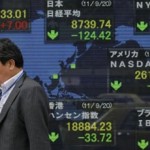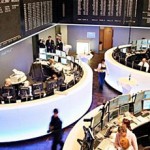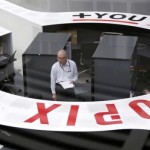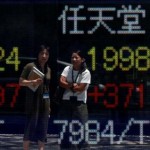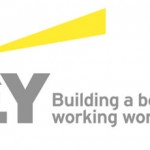Euro edges higher, stocks sag before ECB meeting
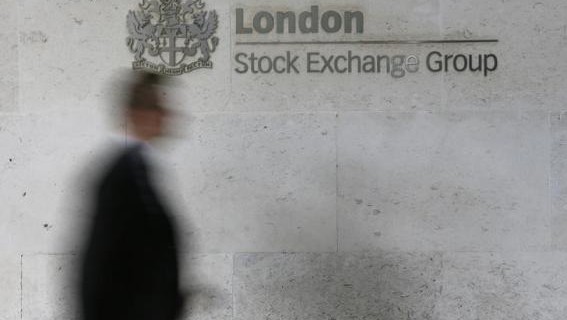
The euro edged higher and European stocks pulled back on Thursday as investors waited to see how ECB chief Mario Draghi responds to another run of poor euro zone data and reports of disquiet about his leadership style.
The bank is set to stick with record low interest rates and a policy plan it laid out over the summer, but markets were watching for signs that Draghi may temper his readiness for more aggressive stimulus given reports of unease about his approach.
As ECB policymakers met in Frankfurt, the OECD warned that the euro zone remained a stubborn weak spot in the global economy and called on the ECB to live up to Draghi’s promise “to do whatever it takes” to preserve the currency union.
European shares .FTEU3 were down 0.3 percent as a mixed batch of company earnings gave investors an additional spur to cash in some of the 10 percent gains they have seen over the last few weeks.
In the currency market, the euro also pushed back above $1.25 EUR= as a recent sharp rally in the dollar, particularly against the yen, came to a halt after more volatile moves overnight.
But with markets having picked themselves up again after last month’s beating, and political hurdles like the U.S. mid-term elections out of the way, there was a general feeling that the upward trend in stocks and the dollar would continue.
“The market feels great,” said Nick Lawson Managing Director in Global Markets Equity at Deutsche Bank.
“It is a very risk-on mindset set at the moment and if you do get a much more inclusive tone from the ECB and some information on what assets could be bought, we could be off to the races.”
The euro last traded at $1.2515 EUR=, flirting once again with a two-year low of $1.2439 set early in the week, while demand for euro zone government bonds from Germany to Greece gradually picked up in light pre-ECB trading. [GVD/EUR]
Recent disappointing euro zone business surveys, a big cut in European Commission growth forecasts and the Bank of Japan’s surprise decision last week to enhance its already massive monetary stimulus have raised pressure on the ECB to ease more.
“The strategy of purchasing sovereign bonds is a challenge with the structure and rules governing the ECB’s approach. But if you are going to say you need to do whatever it takes we need to think about that,” the OECD’s new chief economist, Catherine Mann of the United States, told Reuters after the publication of its forecasts.
COMMODITY ROUT
The Bank of England also meet on Thursday and left its record low rates in place. There are signs the BoE is edging towards its first post-crisis rate hike, but a slight loss of economic momentum in recent weeks has cooled expectations it will move soon.
Wall Street, which ended at a record high on Wednesday following a sweeping Republican party win in mid-term elections, was expected to start around 0.1-0.2 percent lower.
Payroll processor ADP reported solid U.S. private-sector job growth in October, auguring well for jobs data due on Friday and unemployment claims data will add to the picture when its comes at 1330 GMT (8.30 a.m. EST).
In Asian trading earlier, the region’s shares and commodity currencies had stumbled as the ongoing rout in oil, copper, gold, silver and other key commodities trumped cautious optimism about the strengthening U.S. economy.
Brent oil, which has plunged 30 percent since June, remained near a four-year low at 82.70 a barrel LCOc1. Copper CMCU3, a barometer of global demand, eased 0.3 percent to $6,618.25 per metric ton (1.1023 tons), while gold XAU= and silver XAG= steadied after slumping at 4-1/2-year lows. [MET/L][O/R]
MSCI’s broadest index of Asia-Pacific shares outside Japan .MIAPJ0000PUS fell as much as 0.5 percent before largely recovering, led by declines in Australia and China, and Tokyo .N225 ended down 0.9 percent as traders booked profits from their 8-plus percent rise over the past three days.
The Australian dollar, often used a liquid proxy for China, to which it is heavily exposed, flirted with Wednesday’s four-year low of $0.8606 AUD=D4 while the Canadian dollar stood near five-year lows of C$1.1466 to the U.S. dollar CAD=D4.
Many other commodity exporters took an even bigger hit.
The Brazilian real remained within touching distance of a six-year trough hit last week BRL= and Russia’s rouble RUBUTSTN=MCX crashed to another record low a day after the central bank effectively abandoned daily inventions. [EMRG/FRX]
Reflecting the selloff, MSCI’s emerging market index .MSCIEF is now at its cheapest level since 2005 in comparison to the U.S. S&P 500. Almost 30 percent of emerging markets are oil exporters and many others depend on mining or other commodities.
“While I would put about a 70 percent chance that the global economy will chug along, the fact that two of the BRICs bloc are facing problems does raise some caution,” said Soichiro Monji, chief strategist at Daiwa SB Investments.
Source: Reuters – Euro edges higher, stocks sag before ECB meeting









